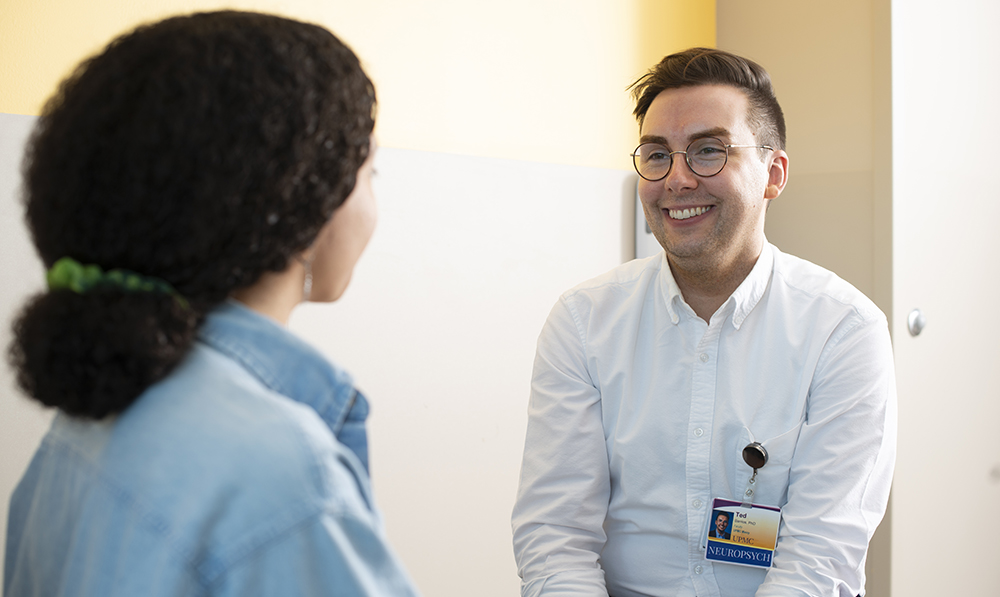Neuropsychology examines brain-behavior relationships. More specifically, neuropsychologists are licensed professionals who evaluate cognitive abilities such as memory, attention, visual-spatial skills, and problem solving. Through testing and interviews, neuropsychologists identify strengths and weaknesses, and work with the rehabilitation team to develop personalized strategies for each individual. The aim of these strategies is to compensate for deficits and utilize strengths most effectively in an effort to maximize functional gains.

Rehabilitation psychology is the psychological evaluation and treatment of persons with disabilities. Whether people are born with their disabilities or acquire them later in life, rehabilitation psychologists help them to lead functional, fulfilling, and meaningful lives. Rehabilitation psychologists help people deal with conditions and issues stemming from disability such as chronic health conditions, emotional problems, and psychosocial problems.
Understanding disability related impairments and the effects on patients and families is necessary when designing effective treatment programs:
- Rehabilitation regimens - Clinicians work side by side with physiatrists and therapists to achieve the best patient outcomes possible.
- Training curriculum - Faculty educate physicians and scientists about therapeutic and neuropharmacologic agents and the effects of such interventions on cognition, behavior, and emotion.
- Research studies - Researchers investigate rehabilitation strategies that will improve the rate and effectiveness of patient recovery.
- Adult Inpatient Rehabilitation Psychology and Neuropsychology Program
The Adult Inpatient Rehabilitation Psychology and Neuropsychology Program provides services the UPMC Rehabilitation Institute at UPMC Mercy. The Institute has 76 dedicated post-acute rehab beds divided into four units and holds the centers of excellence in stroke rehabilitation, brain injury rehabilitation, and spinal cord injury. Additional patient populations include burn survivors, amputees, oncology, and individuals with medical complexities. Services include brief neuropsychological assessments, patient and family education and counseling to address adjustment to disability, capacity evaluations, and consultation on the trauma/burn service. We work along with the post-acute interdisciplinary team to maximize goals and address barriers to completing rehab. Furthermore, our faculty participate in ongoing program development for the rehab units, participate in clinical research opportunities, provide regular education series to incoming rehab nursing staff and participate in UPMC Mercy’s Ethics meetings. We also provide ongoing education to residents in the PM&R department, medical, and therapy students, rehab staff, and geriatric psychiatry fellows. Our goal includes continued expansion of the division in order to provide a wider range of services to our patients and community, including expansion to outpatient, services to our other post-acute rehab units within the UPMC system, and post-doctoral rehabilitation psychology training opportunities.
- Adult Outpatient Neuropsychology and Rehabilitation Psychology Program
The Adult Outpatient Neuropsychology and Rehabilitation Psychology Program includes adult outpatient neuropsychological testing at UPMC Mercy. Services include outpatient neuropsychological assessments for patients with traumatic brain injury, stroke, epilepsy, neurodegenerative disorders, and other neurological conditions. We assist physicians with rehabilitation goals and provide recommendations to help maximize rehabilitation success. Presentations are given to faculty and therapy staff as needed on topics related to neuropsychological assessment.
- Pediatric Neuropsychology Program
The Pediatric Neuropsychology Program at the UPMC Children’s Hospital of Pittsburgh (CHP) provides a variety of inpatient and outpatient clinical services. On the outpatient side, we service the entire Children’s Hospital, offering comprehensive neuropsychological evaluations to children with complex medical conditions that affect cognition. We work with children who have experienced brain injury, stroke, seizures/epilepsy, cerebral palsy, prematurity, spina bifida, congenital heart disease, brain tumors, solid tumors, leukemia and lymphoma, toxin exposure, genetic disorders, and transplants. We also participate in CHP’s multidisciplinary Acquired Brain Injury Clinic by providing screening services, as well as ongoing management for neurocognitive sequelae. We support the ENT/Audiology Division with pre- and post-cochlear implant evaluations and screenings for more comprehensive assessment needs. Additionally, we offer streamlined baseline assessments for children newly diagnosed with brain tumors. We also provide clinical services on the 8-bed inpatient Children’s Hospital Rehabilitation Unit (CHRU). As part of this transdisciplinary team, we provide psychoeducation, school planning, treatment planning, and brief inpatient assessment for children and their families.
